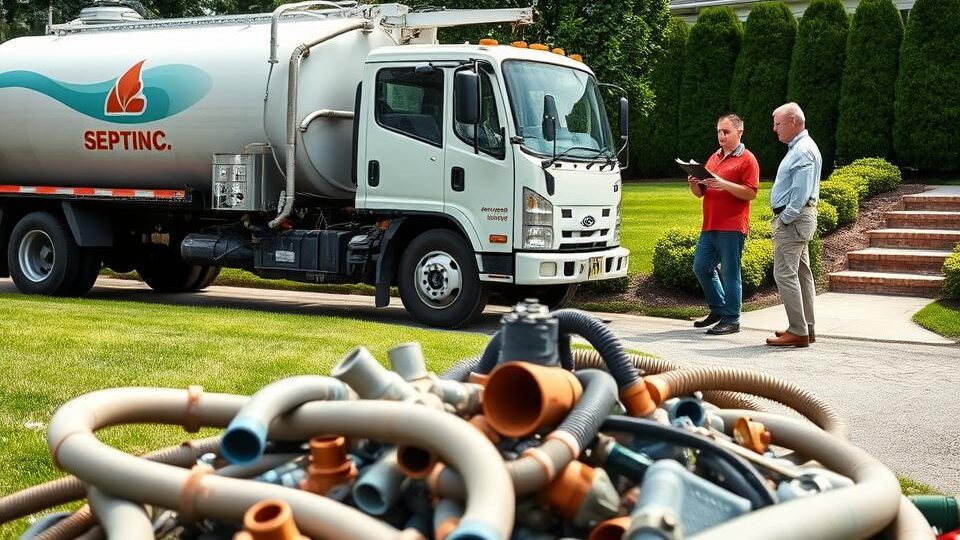
How to Check Licensing of Septic Pumping Companies Near Me in Wasco
Preserve Septic System Cleaning for Tank Health
Have you ever wondered concerning the consequences of overlooking septic system upkeep? For homeowners relying on these systems for sewage handling, skipping scheduled care can result in significant bills. It also creates hazards to both health and the ecosystem. Pumping your septic system is far from a simple task; it’s essential for ensuring your home operates efficiently. By routinely pumping your septic tank, you stop solid waste accumulation and lengthen the longevity of your unit. This preventive stance helps you sidestep any unwanted scenarios. Discover the significance of septic tank upkeep and the steps required with septic tank cleaning service.
Significant Points
- Regular septic system servicing is essential for avoiding expensive restorations.
- Neglecting maintenance can cause dangerous conditions for your loved ones.
- Comprehending your septic system helps in proper stewardship.
- Symptoms of a failing septic system should be noticed quickly.
- Professional contractors can assist in maintaining excellent tank health.
Comprehending Your Septic System
A septic system is an effective on‑property solution for processing wastewater. It mainly consists of two parts: the septic tank and the absorption field. Both are vital for delivering adequate purification and protecting the ecosystem.
The septic tank collects wastewater from your home. There, waste solids drop to the base, and fluids float to the upper layer. Bacteria within the tank break down the organics, making the outflow more manageable to process. This pre‑treated wastewater then moves to the absorption area for additional filtering by the soil, completing the cleanup.
It’s important for homeowners to appreciate the workings of their septic system. Knowing how the septic tank and leachfield operate in tandem can result in enhanced system care. This understanding promotes proper maintenance practices, supporting the system’s robustness.

Significance of Regular Septic System Cleaning
Consistent cleaning of the septic system is key for domestic and environmental health. If ignored, unprocessed wastewater can seep into your yard. This escape can cause well water contamination, introducing health risks. By servicing the septic system clean, you protect your household and the environment.
It’s suggested to service the septic system every 3‑5 years, based on how much you rely on it. Such care is not just environmentally wise; it heads off big bills. A septic system that’s properly cared for works more efficiently, ensuring a cleaner household and a cleaner ecosystem.
Warnings Your Septic Tank Needs Cleaning
Homeowners need to recognize clues that their septic tank may need pumping. Common indicators to look out for are:
- Sluggish draining in sinks, bathtubs, and toilets
- Bad stenches near the drainfield
- Effluent overflows in household plumbing
- Persistent damp zones or extra‑green sections of grass over the septic system
It’s important to identify these symptoms early to avert serious septic tank problems. Routine inspections are vital. They help spot issues before they escalate to pricey restorations. Checking your system periodically guarantees it operates well and lasts longer.
Being mindful and responding quickly are crucial for septic system care. By monitoring these red flags, you can preserve your septic system in top shape.
Septic System Pumping Frequency
Servicing your septic system regularly is central to ensuring your home’s plumbing in good order. Experts typically recommend pumping the septic tank every three to five years. However, this can vary according to the size of your home, how much water you use, and the size of your tank.
If you have a larger household that draws more water, you may require to service the system more frequently. Watching your water use can let you determine if you need to revise your service schedule.
All in Sanitation recommends setting up a reliable pumping schedule that matches your household’s unique needs. Adhering to a regular maintenance routine keeps your septic system functioning efficiently and prevents costly repairs.
Septic System Cleaning: Best Practices
For a septic system to stay healthy, homeowners must follow important guidelines. It’s vital not to send down items that won’t break down; doing so stops blockages and ensures the system working well. Similarly, limiting harsh chemicals preserves the necessary bacterial balance. These actions are vital for the system’s durability and effectiveness.
Proactivity with scheduled inspections is crucial. Setting up periodic assessments can catch issues quickly, facilitating prompt fixes. Additionally, reducing water through fixing leaks and mindful usage aids septic tank health. These measures ensure the system runs efficiently for decades.
It’s also wise not to park on the absorption area. Leaving this area clear allows it properly manage effluent, shielding your system from damage. Listening to advice from specialists like All in Sanitation also enhances septic system care.
The Process of Septic Tank Pumping
For homeowners, grasping the septic system maintenance process is crucial. A licensed septic pumper should perform routine septic tank pumping to keep your system operating properly. The first step is assessing the tank’s state to determine when it requires pumping.
A septic tank demands pumping once the solids take up about one‑third to 50 percent of its space. The licensed septic pumper will then clear out these deposits. This step preserves the system’s effectiveness. Furthermore, the visit may involve checking the tank for potential issues, facilitating quick fixes.
Keeping a record of each pumping session is wise. This log helps homeowners keep tabs on their septic system’s maintenance, and is helpful if selling the property. Adequate septic system maintenance improves its life span and performance, averting costly fixes down the line.
Septic Tank Inspection: What to Watch For
Scheduled inspections are essential for your septic system’s health. Using a thorough septic tank inspection checklist can uncover possible issues promptly. Inspections should be performed by a licensed contractor every one‑to‑two years. They will gauge sludge levels and the scum layer’s condition during this time.
Examining the internal baffles and outflow filters is also crucial. These parts are key for your septic system’s efficient operation. Finding seepage or issues early can sidestep large repair costs. Proactive measures, like adhering to an inspection checklist, boost your system’s durability and effectiveness.
Specialized Septic System Services
Using expert septic system services is vital for your septic system’s health. By partnering with a company like All in Sanitation, you make sure that skilled technicians take care of the cleaning, inspections, and repairs carefully. Licensed septic professionals have expertise, helping homeowners to sustain the system’s peak functionality long‑term.
Upkeep by qualified pros lowers the risk of sudden breakdowns and expensive restorations. These services incorporate comprehensive inspections that assess the system’s state, locating possible problems early. Taking this preventive approach substantially lengthens your septic system’s life.
At the end of the day, delegating your septic system to qualified experts offers reassurance. Collaborating with companies such as All in Sanitation leverages their experience. It secures the wellbeing of your tank, fostering trust in its maintenance.
Septic System Maintenance Advice for Homeowners
Homeowners have the ability to ensure their septic systems operating smoothly. Applying effective care hints significantly boosts their operation. Implementing simple changes to water usage, like limiting unnecessary use and distributing the use of appliances, reduces strain on the system.
Fitting water‑saving faucets in your bathrooms and galleys greatly bolsters septic longevity. These fixtures lower water use without sacrificing functionality. Avoiding garbage disposals is smart too, as they produce more residue in the system, demanding increased upkeep.
Routine inspections and adhering to a proper maintenance routine will prolong your septic system’s service. Staying aware of everything that flows into your drains is crucial for maintaining a robust septic environment. By practicing these measures, you’ll immensely support your septic system’s functionality and lifespan.
Common Septic System Issues
Septic systems may face various issues over time, necessitating repairs. Frequent concerns involve leaks, broken baffles, and flow problems in the leachfield. By recognizing the warnings promptly, homeowners can resolve them quickly, keeping their system stays in good condition.
Usual repairs include:
- Replacing damaged parts to restore system integrity
- Repairing or replacing damaged pipes to prevent leaks
- Unblocking plugged lines to ensure proper drainage
Fixing septic problems swiftly not only cuts expenses over time but also lengthens the system’s life. Scheduled check‑ups and maintenance can help prevent these problems, supporting the care of a sound septic system.
In Summary
Keeping your septic system sound is central to planetary and household well‑being. Consistent cleanings and inspections prevent hefty bills and hazards. Taking initiative with septic care protects resources and reduces concern.
Using specialists like All in Sanitation delivers top‑notch upkeep adapted to your needs. Their experience aids catch issues quickly, averting major troubles and highlighting the need for scheduled inspections.
Adopting best practices for septic maintenance delivers long‑term system effectiveness. A bit of maintenance in the present secures a better‑functioning septic system in the years ahead.